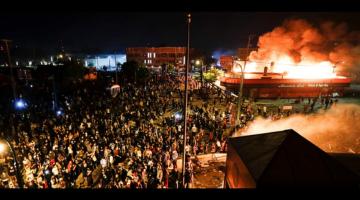The illegal slave trade continued right up to the Civil War, requiring US authorities to “recapture” and then expel the human cargo.
“U.S. law mandated the ‘removal’ of Africans seized from illegal slavers, which led to their detention in federal camps and a second forced passage to Liberia.”
In this series, we ask acclaimed authors to answer five questions about their book. This week’s featured author is Sharla Fett.Fett is Professor of History at Occidental College. Her book is Recaptured Africans: Surviving Slave Ships, Detention, and Dislocation in the Final Years of the Slave Trade.
Roberto Sirvent: How can your book help BAR readers understand the current political and social climate?
Sharla Fett: Recaptured Africans deals with the traumas of slavery and displacement in an era when children made up almost half of African captives aboard many illegal slave ships. BAR readers will already understand that family separation permeates the entire history of the transatlantic slave trade. Being wrenched from one’s kin was a central part of the ordeal of human commodification and the threat of “social death.” Within that broader history, however, this book examines the distinct experiences of Africans seized from mid-nineteenth-century illegal slavers. Almost two thousand African men, women, and children were taken into custody from intercepted ships by the U.S. government in 1858 and 1860. Though legally freed, these slave ship survivors entered a new phase of captivity defined by death, forced migration, and U.S. racial politics. The book explores both the trauma of this experience and the importance of shipmate relations for physical and social survival.
“Being wrenched from one’s kin was a central part of the ordeal of human commodification and the threat of ‘social death.’”
I seek to offer a deep historical perspective on today's U.S. border policies and the continuing devaluation of Black life in so many aspects of American society. U.S. law mandated the “removal” of Africans seized from illegal slavers, which led to their detention in federal camps and a second forced passage to Liberia. The experiences of recaptive Africans thus represent an early case study of how the American government has treated stateless, displaced people in its custody. Beyond this, the white American press and public viewed African slave ship survivors through a lens of white supremacy. Contemporary newspaper accounts reveal how representations of recaptives as exotic “savages” overrode pressing questions of redress or rights. Lastly, the book highlights the devaluation of African children’s lives in the very years when the middle class was fashioning an ideal of white childhood as precious and worthy of special protection.
What do you hope activists and community organizers will take away from reading your book?
I would hope that community organizers would pay special attention to the chapter on how New York’s Black activists protested the illegal transatlantic slave trade and spoke up for the human rights of slave ship recaptives. In particular, the former fugitive slave Rev. James Pennington condemned the way U.S. policies of slave trade suppression failed to prioritize the needs of enslaved Africans. Evidence from African American newspapers, slave narratives, and Black-authored literature shows us how Black abolitionists viewed their work in terms of a global freedom struggle. Their analysis of the illegal slave trade linked the historical experiences of Black people in North America, the Caribbean, and the African continent. Furthermore, Recaptured Africans expands our understanding of the involvement of the United States with the institution of slavery. This historical understanding is crucial to activists today who call attention to the ways in which slavery is and is not memorialized and commemorated in public. For example, in the wake of the Charleston City Council’s recent apology for its role in the slave trade, community activists may want to consider supporting a public commemoration of the Echo recaptives detained at Fort Sumter.
We know readers will learn a lot from your book, but what do you hope readers will un-learn? In other words, is there a particular ideology you’re hoping to dismantle?
I hope this book contributes in several ways to un-learning a simplistic history of slavery and emancipation. Emancipation was neither a simple linear progression from slavery to freedom nor was it only a domestic issue. The British and American abolition of the slave trade was written into law in 1807. Nevertheless, millions of Africans continued to be trafficked by transnational rings of slave smugglers in Cuba, Brazil, Angola, and the United States. To understand that history, we need to unlearn a heroic narrative of abolition and understand how U.S. money, ships, and sailors continued to fuel the illegal trade. Recaptured Africans also complicates an idea of emancipation as a story mostly about Lincoln, the Civil War, and the Emancipation Proclamation. Few non-specialists think of the transatlantic slave trade as playing a major role in American society at mid-century. This book, along with work by Walter Johnson, Manisha Sinha, and Gerald Horne shows otherwise. Going back into the newspapers, speeches, and government records of the period reveals how the illegal slave trade appears everywhere in American politics and culture, from novels by Herman Melville and Martin Delany to proslavery secessionist strategy.
Finally, readers of this book will have to un-learn any romantic ideas about humanitarian efforts to suppress the slave trade. Even American and Liberian officials who invested themselves in meeting the dire human needs of recaptive Africans worked from ideologies of colonialism and/or white supremacy.
Who are the intellectual heroes that inspire your work?
W.E.B. Du Bois belongs first on this list. While writing Recaptured Africans, I returned frequently to his 1896 dissertation study The Suppression of the African Slave-Trade to the United States of America and the retrospective “Apologia” that he wrote for the book’s republication sixty years later. Looking back, Du Bois noted that he had viewed the history of U.S. slave trade suppression primarily through a moral lens and wished that he had attended to the insights of both Freud and Marx. For example, he wished that he had incorporated into his study “the clear concept of Marx on the class struggle for income and power, beneath which all considerations of right or morals were twisted or utterly crushed” (329). Du Bois’s powerful critique of the limits of U.S. legal action against the slave trade affirmed the importance of the topic during my long writing process.
“Du Bois wished that he had attended to the insights of both Freud and Marx.”
Recaptured Africans tells a story with sadness and pain that cannot be fully expressed in scholarly history writing, but which must nevertheless be acknowledged. I found both intellectual and spiritual sustenance in Yvette Christiansë’s Castaway poems centered on the history of liberated Africans in St. Helena. I thank her for writing these beautiful elegies.
I have an enormous appreciation for scholars who have crafted model global histories of the nineteenth-century Black Atlantic. These include Roquinaldo Ferriera, Walter Hawthorne, Gerald Horne, and James Sweet. Historians of the transatlantic slave trade and the African diaspora constantly contend with gaps and silences in the historical record. I’m indebted to the inspirational work of Vincent Brown, Stephanie Camp, Saidiya Hartman, Jennifer Morgan, and Stephanie Smallwood. Each wrestled with an archive born in violence and found new ways to interpret the histories of the enslaved. Please see my acknowledgements and lengthy bibliography for more inspirational writers deserving of mention!
In what way does your book help us imagine new worlds?
In piecing together this story, I wanted to recuperate the histories of those who, on the brink of existence held fast to shipmate communities and, when they reached slightly more secure ground in Liberia, fought to remain together and to refuse conditions they viewed as tantamount to slavery. Especially in the chapter on forced voyages to Liberia, I explore how both adults and children imagined and created new social worlds in the midst of death and great deprivation. This took innovation, courage, and collective strength.
Because the book concerns so many recaptive youth, it poses the question, what do children who have suffered severe loss and trauma need to rebuild social worlds—to the extent that rebuilding is even possible? Informed by insights from scholars Sylviane Diouf and Benjamin Lawrance, I could see in my evidence that adults had a broader repertoire of knowledge to draw on. They led funerals, conducted healing ceremonies, served as translators and organized physical resistance to separation or abuse. African child captives had not completed their initiations in home societies. In their vulnerability, they prioritized the search for security and protection. One preliminary answer to the question posed above is that children need adults who understand and can protect them to imagine a new world beyond the trauma. The African adults and children in my book had the unusual possibility of staying with their original shipmates—primarily Kikongo and Yoruba speaking groups—in their journey to Liberia. Common languages, shared experience, and collective resistance provided some of the necessary materials for imagining new worlds that would never replace the memory of their old ones.
Roberto Sirvent is Professor of Political and Social Ethics at Hope International University in Fullerton, CA. He also serves as the Outreach and Mentoring Coordinator for the Political Theology Network. He is co-author, with fellow BAR contributor Danny Haiphong, of the forthcoming book, American Exceptionalism and American Innocence: A People’s History of Fake News—From the Revolutionary War to the War on Terror.
Comments?
Please join the conversation on Black Agenda Report's Facebook page at http://facebook.com/blackagendareport
Or, you can comment by emailing us at coments@blackagendareport.com



















